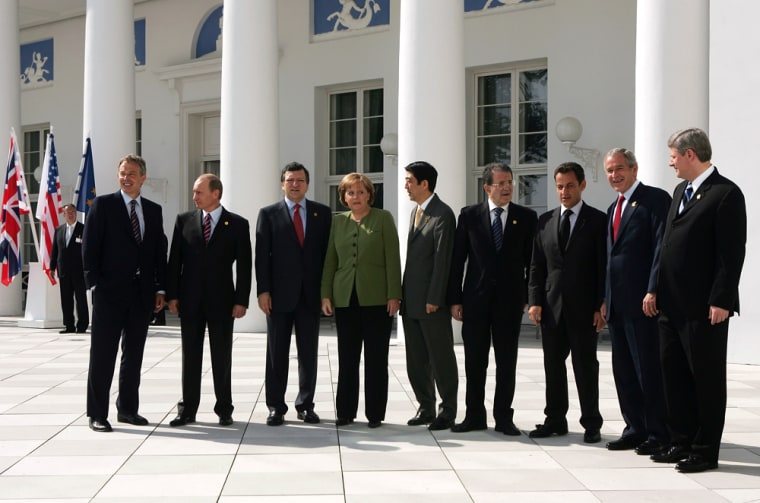Russian President Vladimir Putin, bitterly opposed to a U.S. missile shield in Europe, told President Bush on Thursday that Moscow would drop its objections if the radar-based system were installed in Azerbaijan.
Putin told Bush he would not seek to retarget Russian missiles on Europe if the United States agreed to put the system in the central Asian nation of Azerbaijan, a former Soviet republic.
National Security Adviser Steve Hadley called it an “interesting proposal.”
“Let’s let our experts have a look at it,” Hadley said.
Bush has proposed putting the radar and rockets in the Czech Republic and Poland.
“This will create grounds for common work,” Putin told Bush as they met on the sidelines of a summit of the world’s eight major industrialized democracies being held at this seaside resort.
Bush, speaking before Putin, said that the Russian president had presented some interesting suggestions and that they would pursue the issue during two days of talks beginning July 1 in Kennebunkport, Maine, at the Bush family’s oceanfront compound.
“We both agreed to have a strategic dialogue,” Bush said. “This is a serious issue.”
Putin’s proposal to put the system in Azerbaijan was a surprise.
‘We asked the Russians to cooperate’
The Russian leader said the proposed relocation would alleviate Russia’s concerns about a missile shield based in Europe. Moreover, he said an Azerbaijan-based system would cover all of Europe rather than part it.
Hadley did not rule out the possibility that the end result would be some mix of the Russian and the U.S. proposals.
“We asked the Russians to cooperate with us on missile defense, and what we got was a willingness to do so,” Hadley said after the Bush-Putin meeting.
Putin laid out several conditions that would lead Russia to drop its opposition to a new missile shield:
- Taking Russia’s concerns into account.
- Giving all sides “equal access” to the system.
- Making the development of the system transparent.
“Then we will have no problem,” the Russian leader said.
‘Complex’ relations
Bush this week put Russia on a par with China, calling U.S.-Russian ties “complex” and criticizing democracy as having being “derailed” under Putin. The remarks carried extra sting because they were delivered publicly and in the Czech Republic. The NATO membership of the former Soviet satellite, which threw off communism in 1989, along with others, is a thorn in Russia’s side.
Putin next month will become the first world leader during Bush’s presidency to come to the Bush family’s summer compound on the Maine coast. The two — once so close in the aftermath of the Sept. 11, 2001, attacks — last met in November, in Hanoi, Vietnam.
Blair, too, is scheduled to meet Putin privately. He is expected to speak to Putin about Russia’s worsening relations with the U.S. and Europe, as well as the case of an ex-Soviet spy poisoned in Britain.
Britain’s relations with Russia have soured considerably over the November poisoning death of ex-Soviet agent Alexander Litvinenko, a fierce Kremlin critic who pointed the finger at Putin from his deathbed.
Britain has requested the extradition from Russia of Andrei Lugovoi, the only named suspect in Litvinenko’s murder — a request Putin characterized as “stupidity.”
The Kremlin warned Britain against “politicizing” the Litvinenko case.
Meanwhile, Litvinenko’s widow, Marina, urged world leaders to press Putin about the source of the polonium-210 that poisoned him. It is widely believed that around 90 percent of the world’s supply of polonium comes from a single Russian laboratory.
